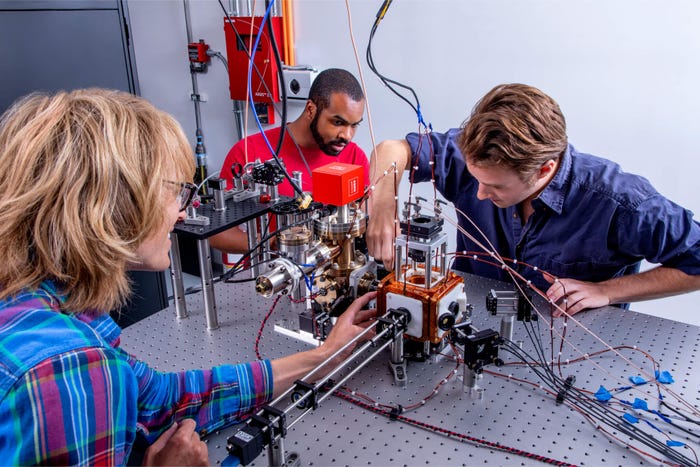
Connects decision-makers and solutions creators to what's next in quantum computing
Deloitte Aids World Economic Forum on Quantum: Q&ADeloitte Aids World Economic Forum on Quantum: Q&A
The role of the international quantum computing ecosystem and the convergence of AI with quantum

The World Economic Forum (WEF) published its Quantum Economy Blueprint earlier this year in collaboration with IBM and SandboxAQ. It aimed to advise organizations and governments on how they can prepare a sound quantum strategy as wider adoption gets closer.
A Deloitte team, including global quantum computing lead Scott Buchholz, advised on the report, sharing insights from the company’s experience of working with clients on quantum projects in the field.
As the need for a global approach to the next stage of quantum computing development becomes more apparent and governments recognize the importance of funding to keep their nations competitive, Buchholz delivers an update on quantum’s role on the global stage.
Enter Quantum: What was the Deloitte contribution to the WEF quantum report?
Scott Buchholz: We help the WEF in different ways because they have two quantum groups. One is focused on what sorts of things might be enabled by quantum computers in the future—what use cases, business problems and societal problems can be solved—and the other half is what do people need to do to get ready for quantum computers that can potentially break existing encryption.
On the use case side, which I always find a more pleasant discussion, is the acceleration in what people are finding and new capabilities. It will not quite be able to displace existing production techniques, with some small exceptions.
The WEF is trying to help governments interested in participating in this space to put a program together. How do you leverage the strengths of your region and country, how can you play in the ecosystem and make sure that you are staying abreast of what's going on?
That’s what the WEF tends to focus on more than specific details about particular use cases.
How does an advisory role like the WEF’s balance global and national drivers for governments?
The WEF has a very wide and diverse group of stakeholders practiced in helping those groups come together to reach some degree of consensus. We are one of the inputs to those discussions.
The WEF does a lot with emerging countries that are in different stages of emerging technologies. They have a playbook to help governments around the world understand what they could do with them. Quantum is not the only one they've tried to help with.
They've also done it with AI and other technologies. “Rinse and repeat” doesn’t do justice to the level of work that went into it. On the other hand, there are several common themes that they've found over the years.
Quantum is a little different than some of the others because it can combine the usage, software and hardware components. All of those aspects have different subtleties, which makes the quantum umbrella a little different in some ways to, for example, AI, which tends to be more application focused.
It's perhaps more interesting in that regard because countries have a wider space of options to consider. In particular, the hardware options tend to have a lot more cost associated with them. There is that trade-off when deciding to go with something that's very expensive and perceived as higher risk. If so, how, if not, how do we want to focus our energy in the other areas?
A recent Omdia report found that governments seem to be backing quantum efforts after perhaps having missed the boat on AI. Does that reflect what you hear?
I believe so. Two things are true about AI. One is that what we call artificial intelligence keeps moving every couple of years. I remember a decade ago, the idea of being able to have a conversation with your phone was science fiction and now we call it Siri or Google or Alexa or what have you. It's no longer AI because it's everyday functionality.
AI has been around since the 60s as a concept, but the bar for how we define it keeps moving. Part of the challenge with AI is that people haven't necessarily had something that focuses the mind in quite the same way. When big things happen, people go, oh, we need some of that but we’re behind relative to that. That's part of what you're seeing in AI.
In quantum, there are a couple of things that focus minds and as a result, it's easier to see. You've got the dynamic of we feel like we missed out on this one and it feels like there's a bigger outcome here. That combination of things and the perceived fuzziness drives different behaviors.
What have been your observations about the convergence between quantum and machine learning?
We're seeing increasing levels of capability in what we call quantum machine learning. There are a handful of things that can already enhance the machine learning algorithms that some organizations run today.
As we look to the future, what we're seeing in the quantum machine learning space is that when we're creating machine learning models, they seem to be able to train to higher accuracy with less data than the comparable classical models.
That becomes interesting because there are problems that people care about in areas of advanced machine learning, which that enables in different ways. One of those instances is in the space of generative AI, which includes large language models but also a lot of other things like generating images for medical applications and a variety of other synthetic data.
There's an approach called a generative adversarial network, which is a big word for saying I have two machine learning algorithms that I pit against one another. One's job is to figure out if something is real or fake. The other’s job is to do a better job of generating fake data.
You run the two of them in parallel for a while and the generator gets better at generating fake data over time so you can use that over time to generate synthetic data. It turns out that doing this classically is really difficult, but because of the way quantum works, people believe, as near as we can tell today, that it's going to be much more effective to do in quantum computers.
That becomes exciting because that might mean we can apply some of these things in new in different places. Then the question becomes, are we going to run our large language models—ChatGPT cloud AI, you name it—on quantum computers anytime soon? Probably not.
On the other hand, there is a universe of machine learning that we use to detect fraud or identify the priority things to triage that may well be enhanced.
About the Author
You May Also Like






